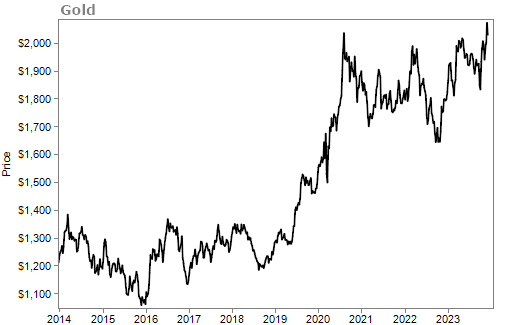When investors see uncertainty in the economy and the markets, they have a typical playbook... They get defensive. They usually load up on bonds, utility stocks... and gold.
That means we can track prices of these assets to see when folks are turning to them. And earlier this week, the price of gold hit an all-time high...

Regular Health & Wealth Bulletin readers likely aren't surprised by this move. Last month, I wrote:
The tide appears to be turning for this asset...
For the past couple of years, it has been hated. No one has wanted to own it.
It was once touted as protection against inflation. But while inflation raged in 2022, this asset was flat for the year. Die-hard fans had given up hope, especially as bond yields began to soar and 5% interest rates were guaranteed.
But I'm writing to you today to urge you to own some of it.
Things in the economy and the markets are getting murky. And while optimism has been high even while inflation was rising, there are cracks forming.
I hope you've been following my advice and loading up your portfolio with defensive plays. While I'm long-term bullish on stocks – the stock market is the greatest wealth-creation tool in history – when the markets are experiencing uncertainty like we're seeing now, you want to keep your money safe.
Of course, the downside of owning gold is that it doesn't pay any dividends or give you a stream of income. That's why you don't want to cash out of stocks entirely. Instead, you want to find the best stocks to own no matter what happens.
On Wednesday, my colleagues Joel Litman and Marc Chaikin teamed up to unveil the "Perfect Stock Indicator."
They're predicting that we'll see one of the most volatile, difficult-to-navigate markets in financial history in 2024. But this is actually a great environment to find "Perfect Stocks."
If you missed the event, click here to catch up on all the details, including four free recommendations.
Now, let's dig into some questions... As always, keep sending your comments, questions, and topic suggestions to [email protected]. My team and I really do read every e-mail.
Q: Quite some time ago you recommended ceramic pods versus the plastic containers for the Keurig coffee maker. Can you find the source of purchasing these ceramic pods? Regards. – J.D.
A: Many workplaces and homes use the convenient single-use disposable-coffee pods. The U.S. Food and Drug Administration approved these pods as bisphenol A ("BPA") free. However, some companies don't disclose the types of plastic in the pods, only saying they are No. 7 plastic.
The problem is that No. 7 plastic is a general catch-all designation that means "other." However, a lot of No. 7 plastic is made from polycarbonate, which can contain BPA. The pods may not contain polycarbonate, but there is no way to know if they contain something similar. And since plastics can "leach" chemicals similar to BPA – like bisphenol S ("BPS") – when they are heated, it seems a bit risky to use an unknown plastic container to brew steaming hot coffee.
I couldn't find anything on ceramic pods. But a few years ago, I recommended readers use reusable, fully BPA-free pods made of metal and No. 5 recyclable plastic (the same kind recommended for baby bottles). These reusable pods are not only more environmentally conscious, but you can also use any kind of coffee to fill them. We recommend searching on Amazon for stainless steel filters that will fit your coffee maker.
If you use a multi-cup brewer, look for reusable stainless steel filters. Many coffee makers come with reusable or permanent filters, saving you the hassle of looking for a filter that fits.
Q: With regard to the dirty dozen of fruits and vegetables, does frozen versus fresh make a difference? Thanks. – B.D.
A: The Environmental Working Group has a detailed breakdown of how produce is handled and tested, depending on the source of the data, here. Most of the produce tested is fresh (although you'll notice frozen sweet peas made the "Clean Fifteen" list).
Frozen produce typically has fewer pesticides by the time it gets to consumers because of processing. For example, if you buy a bag of fresh carrots, they're typically unpeeled and often have plenty of dirt still on them. But a bag of frozen carrots has likely already been peeled and washed before being frozen. And that peel – the outer part of the produce – is where you'll find the majority of pesticides.
That's why properly washing your fresh produce is so important. As I mentioned last week, do what I do and use a rinse made from three parts water to one part vinegar. I let everything soak for a few minutes and then rinse the fruits and vegetables off with just water. That will get a lot of the impurities off.
What We're Reading...
- Did you miss it? Sometimes you want to own companies that are not innovative.
- Something different: It's OK to be bad at your hobbies.
Here's to our health, wealth, and a great retirement,
Dr. David Eifrig and the Health & Wealth Bulletin Research Team
December 8, 2023
